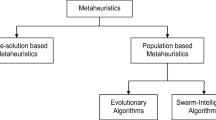Abstract
In existing multi-population cultural algorithms, information is exchanged among sub-populations by individuals. However, migrated individuals cannot reflect enough evolutionary information, which limits the evolution performance. In order to enhance the migration efficiency, a novel multi-population cultural algorithm adopting knowledge migration is proposed. Implicit knowledge extracted from the evolution process of each sub-population directly reflects the information about dominant search space. By migrating knowledge among sub-populations at the constant intervals, the algorithm realizes more effective interaction with less communication cost. Taken benchmark functions with high-dimension as the examples, simulation results indicate that the algorithm can effectively improve the speed of convergence and overcome premature convergence.




Similar content being viewed by others
References
Alami J, Imrani AE, Bouroumi A (2007) A multi-population cultural algorithm using fuzzy clustering. Appl Soft Comput 7(2):506–519
Becerra RL, Coello CAC (2006a) Cultured differential evolution for constrained optimization. Comput Methods Appl Mech Eng 195:4303–4322
Becerra RL, Coello CAC (2006b) Solving hard multi-objective optimization problems using ε-constraint with cultured differential evolution. In: The 9th international conference on parallel problem solving from nature, vol 4193, pp 543–552
Bin P (2005) Knowledge and population swarms in cultural algorithms for dynamic environments, Ph.D Thesis. Wayne State University, Detroit
Coelho LS, Mariani VC (2006) An efficient particle swarm optimization approach based on cultural algorithm applied to mechanical design. In: IEEE conference of evolutionary computation, pp 1099–1104
Cruz AV, Pacheco MC, Vellasco M et al (2005) Cultural operators for a quantum-inspired evolutionary algorithm applied to numerical optimization problems. Lect Notes Comput Sci 3562:1–10
Digalakis JG, Margaritis KG (2002) A multi-population cultural algorithm for the electrical generator scheduling problem. Math Comput Simul 60(3):293–301
Guo Y-n, Gong D-w (2007) Extraction and utilization about knowledge in hierarchical interactive genetic algorithms. Control Decis 22(12):1329–1335
Guo Y-n, Wang H, Cheng J (2010) Adaptive immune clonal selection cultural algorithm. Acta Electronica Sinica (under published)
Ho NB, Tay JC (2004) GENACE: an effective cultural algorithm for solving the flexible job-shop problem. In: Proceeding of 2004 congress on evolutionary computation, pp 1759–1766
Huang H-Y, Gu X-S, Liu M-D (2007) Research on cultural algorithm for solving nonlinear constrained optimization. Acta Automat Sin 33(10):1115–1120
Jin X, Reynolds RG (1999) Using knowledge-based evolutionary computation to solve nonlinear constraint optimization problems: a cultural algorithm approach. 1999 Congress on Evolutionary Computation, pp 1672–1678
Laredo JL, Castillo PA, Mora M, Merelo J (2008) Evolvable agents, a fine grained approach for distributed evolutionary computing: walking towards the peer-to-peer computing frontiers. Soft Comput 12(12):1145–1156
Reynolds RG (1994) An Introduction to cultural algorithms. In: Proceedings of the 3rd annual conference on evolutionary programming, pp 131–139
Saleem SM (2001) Knowledge-based solution to dynamic optimization problems using cultural algorithms. Wayne State University, USA
Wang R-L, Okazaki K (2007) An improved genetic algorithm with conditional genetic operators and its application to set-covering problem. Soft Comput 11(7):687–694
Wei Ma, Zhu X, Zhu Q (2009) Research on cultural continuous ant colony optimization algorithm. Appl Res Comput 26(7):2442–2449
Acknowledgment
This work was supported by National Natural Science Foundation of China under Grant 60805025 and Qinglan Project of Jiangsu.
Author information
Authors and Affiliations
Corresponding author
Rights and permissions
About this article
Cite this article
Guo, Yn., Cheng, J., Cao, Yy. et al. A novel multi-population cultural algorithm adopting knowledge migration. Soft Comput 15, 897–905 (2011). https://doi.org/10.1007/s00500-010-0556-4
Published:
Issue Date:
DOI: https://doi.org/10.1007/s00500-010-0556-4




